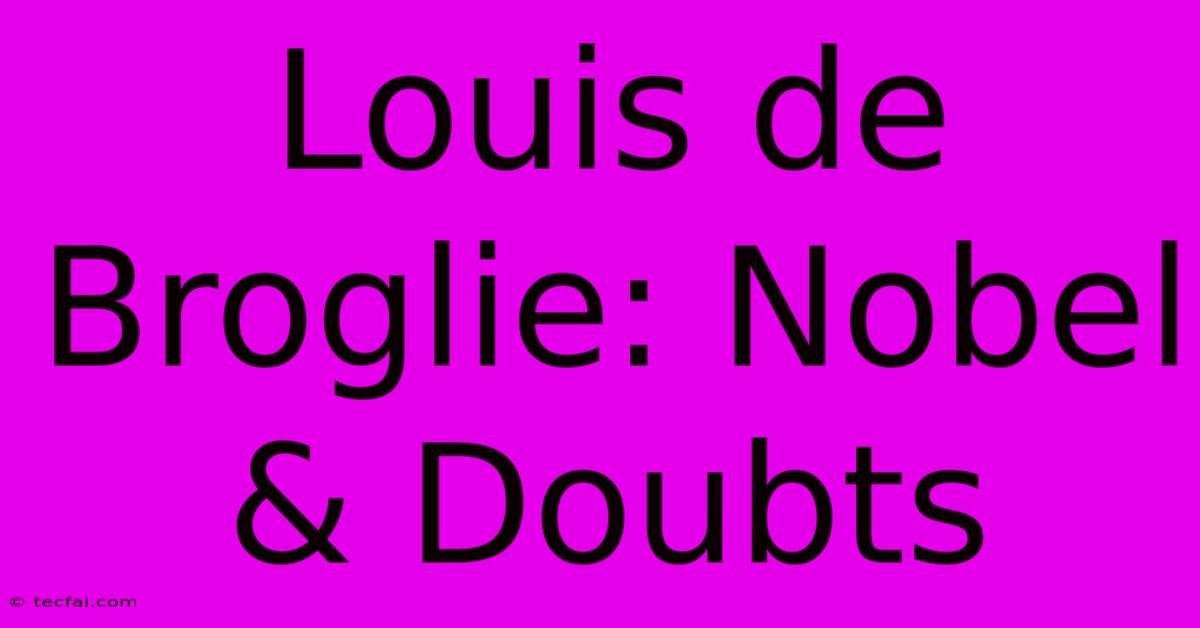Louis De Broglie: Nobel & Doubts

Discover more detailed and exciting information on our website. Click the link below to start your adventure: Visit Best Website tecfai.com. Don't miss out!
Table of Contents
Louis de Broglie: Nobel Laureate and Lingering Doubts
Louis de Broglie, a name synonymous with the revolutionary concept of matter waves, stands as a giant in the history of physics. Awarded the Nobel Prize in Physics in 1929 for his groundbreaking work, his contributions fundamentally altered our understanding of the universe. Yet, even amidst his monumental achievements, certain aspects of his theories and their interpretations continue to spark debate and raise intriguing questions. This article delves into the life and work of Louis de Broglie, examining both his celebrated triumphs and the lingering uncertainties that surround his legacy.
The Genesis of Matter Waves
De Broglie's doctoral thesis, presented in 1924, proposed a radical idea: that matter, like light, exhibits wave-particle duality. This was a bold extension of Einstein's explanation of the photoelectric effect, which demonstrated the particle nature of light. De Broglie postulated that the wavelength of a particle is inversely proportional to its momentum, a relationship expressed by the now-famous de Broglie wavelength equation: λ = h/p, where λ is the wavelength, h is Planck's constant, and p is the momentum.
This seemingly simple equation had profound implications. It suggested that electrons, protons, and even larger objects, possess wave-like properties. This concept formed the cornerstone of wave mechanics and paved the way for the development of quantum mechanics. The experimental verification of electron diffraction by Davisson and Germer in 1927 provided crucial evidence supporting de Broglie's hypothesis.
The Pilot Wave Theory: A Controversial Interpretation
While de Broglie's matter wave concept revolutionized physics, his preferred interpretation, known as the pilot wave theory, has remained somewhat controversial. This theory proposed that particles are guided by a pilot wave, a real physical wave that dictates the particle's trajectory. This contrasted with the prevailing Copenhagen interpretation, which emphasized the probabilistic nature of quantum mechanics and rejected the existence of a deterministic underlying reality.
The pilot wave theory, though elegant in its deterministic approach, faced challenges in explaining certain phenomena and lacked widespread acceptance among physicists. Its perceived complexity and deviation from the dominant Copenhagen interpretation contributed to its relative obscurity for many years.
The Nobel Prize and Beyond
The award of the Nobel Prize in 1929 solidified de Broglie's place in the scientific pantheon. His work became a fundamental pillar of modern physics, influencing countless subsequent discoveries and advancements. His contributions extended beyond the realm of pure theory; he actively engaged in philosophical discussions surrounding the implications of quantum mechanics, contributing to a deeper understanding of the philosophical underpinnings of the field.
However, even with the Nobel's recognition, some doubts persisted. The precise nature of the wave function and its physical reality remained a subject of ongoing debate. The seemingly paradoxical nature of quantum mechanics, where particles can exist in multiple states simultaneously until measured, continues to challenge physicists even today. De Broglie's work, while profoundly influential, highlights the inherent complexities and open questions within the quantum realm.
A Legacy of Innovation and Inquiry
Despite the lingering questions, Louis de Broglie's legacy remains undeniable. His revolutionary ideas transformed our understanding of the universe at its most fundamental level. His work serves as a testament to the power of bold hypotheses, rigorous mathematical formulation, and persistent inquiry, even in the face of significant challenges and persistent scientific debate. While some aspects of his theories continue to be debated, his contribution to the development of quantum mechanics remains an unparalleled achievement in the history of science. His work inspires future generations of physicists to continue pushing the boundaries of our understanding of the cosmos, prompting continued examination and refinement of the fundamental principles governing our universe.

Thank you for visiting our website wich cover about Louis De Broglie: Nobel & Doubts. We hope the information provided has been useful to you. Feel free to contact us if you have any questions or need further assistance. See you next time and dont miss to bookmark.
Featured Posts
-
Louis De Broglie Nobel And Doubts
Nov 27, 2024
-
Kai Trump Views Space X Launch
Nov 27, 2024
-
Pakistan Wins Zimbabwe Match Highlights
Nov 27, 2024
-
Oxford United 0 3 Sheffield United Match Report
Nov 27, 2024
-
County Championship Rothesay And Metro Bank
Nov 27, 2024
